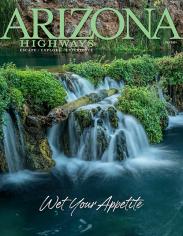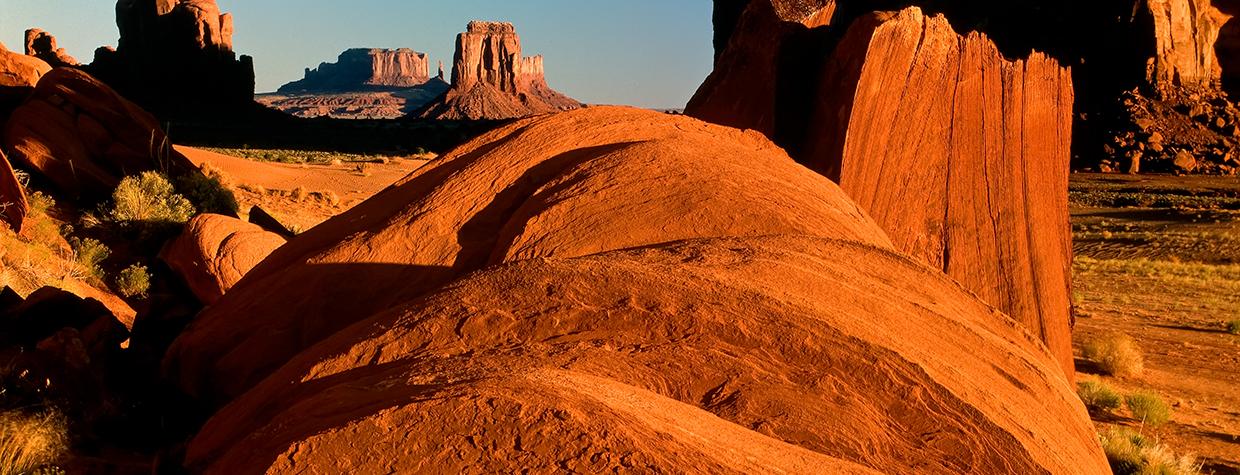Legendary photographer David Muench’s more than seven decades of groundbreaking photography is getting a permanent home. The longtime Arizona Highways contributor — and influence for countless other photographers whose work appears in this magazine — is donating his entire photographic archive to Cline Library at Northern Arizona University in Flagstaff. There, his photographs will join those of his father, Josef, one of the magazine’s earliest contributors. I spoke with Peter Runge, head of the library’s Special Collections and Archives, about how this came about and its larger significance.
JK: How did Cline end up with this collection?
PR: We’ve had Josef Muench’s material at the library for nearly 20 years, and it’s always been a dream or aspiration to eventually have David’s here as well, but we thought that was kind of a reach for us. In the fall of 2018, David’s assistant reached out to me and explained that David was interested in looking for a home for his archival legacy, and she asked if we would be interested — and after I picked up the phone and my jaw, I said, “Absolutely.” David and his wife, [writer and contributor] Ruth Rudner, quickly became part of that conversation via emails and phone calls. In 2019, they came to Flagstaff during a trip through the Southwest and spent two or three days with us at Cline.
JK: What was that experience like?
PR: We gave them a tour of the facility and talked about what we could do with David’s material, and they asked some questions. In preparation for their visit, I had pulled out a couple of boxes of Josef’s work, primarily shots of the Grand Canyon and Monument Valley. David opened one of the boxes, grabbed a transparency, held it up to the light and said, “I just took this photograph yesterday at the Grand Canyon!” He took out his cellphone and opened the picture, and he truly had almost been standing in his father’s footsteps. It was an amazing moment.
JK: Take me through the process of collecting this massive body of work.
PR: It’s been a challenge, because parts of David’s archive were spread among four locations: the Albuquerque area, where David and Ruth lived previously; in Desert Hot Springs, California, with his daughter, Zandria Muench Beraldo; in Santa Barbara, California, with his son, Marc Muench; and in Montana, where David and Ruth live now. The most challenging might have been the Desert Hot Springs portion, which we collected in June. We had to rent a refrigerated vehicle to keep the material safe and temperature-controlled for the drive back to Flagstaff. Counting framed prints, 35 mm slides, 4x5 transparencies and digital files, there may be hundreds of thousands of images in all.
JK: I’ve been involved with Arizona Highways and seeing David’s work since 1978. He’s a true innovator, and his work has influenced so many people. What is the value of having his photos at Cline?
PR: A lot of people are familiar with David’s work through Arizona Highways, but I think the work he’s done over the past 10 to 15 years hasn’t been as publicly available, and that part of this collection is going to be incredibly valuable. Additionally, between David and his father, we’re talking about nearly 90 years of visual documentation of the Colorado Plateau and beyond, and having that much material from one family is remarkable.
JK: What made David decide Cline was the right choice?
PR: He told me the San Francisco Peaks hold a special place in his heart, and that’s a big part of why he wants his collection here. And that’s another thing about the value of this collection. We started picking up material from David and his family in April, and after that, the Peaks suffered two devastating wildfires that will alter the landscape for generations. The secondary, and maybe unintended, value here is that because David shot for more than 70 years and purposely returned to the same locations, we’re able to see these amazing changes in the environment. The Peaks are just one example — the White Mountains and other locations he’s photographed have suffered fires — and his collection is going to be of great value not only to those who enjoy his work as an artist, but also to those who come at it from ecological and cultural perspectives. We’re so incredibly honored to have it here at Cline.
Do you have a question about photography? Email it to [email protected], and our photo editor, Jeff Kida, will try to answer it in a future issue.

